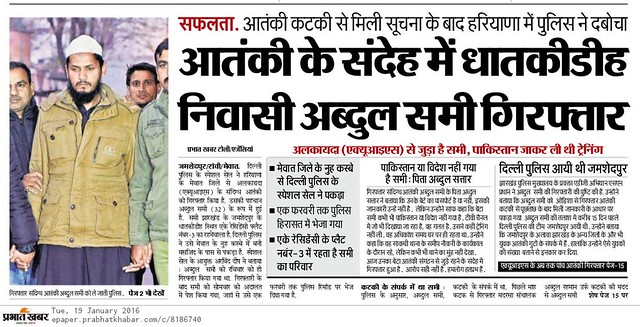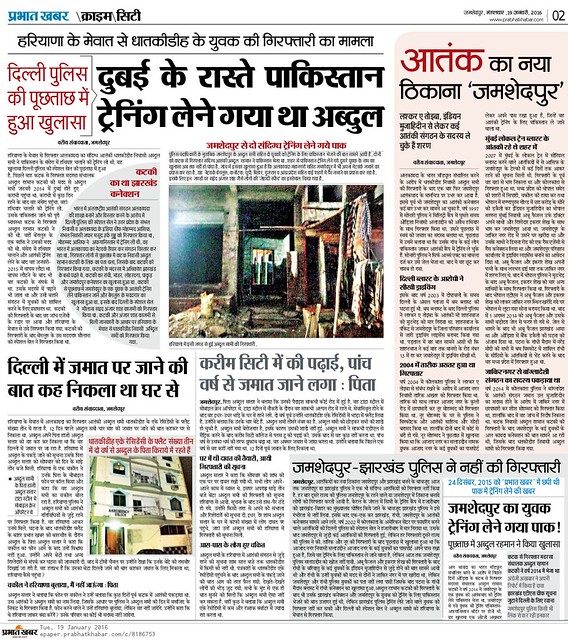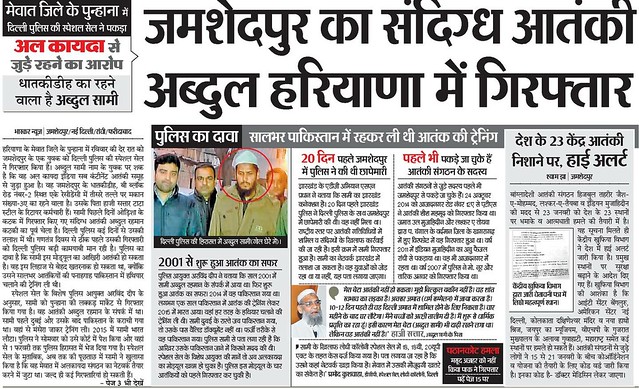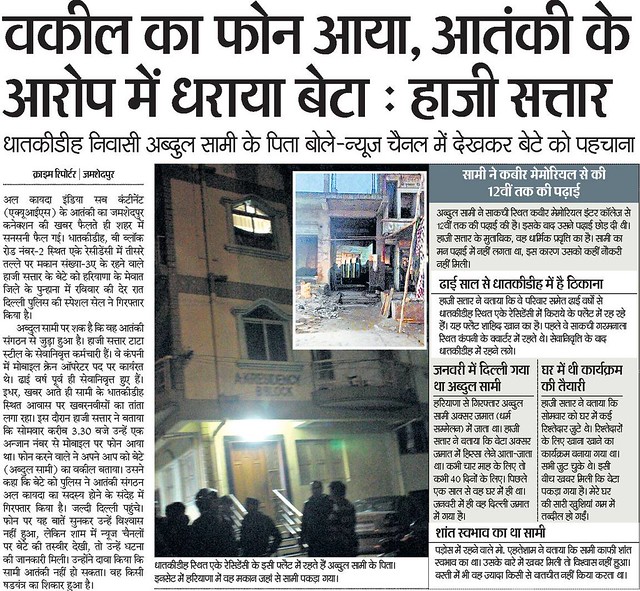By Amit Kumar for Twocircles.net
You may not know too much about Abdul Sami, except that he is alleged to be an Al-Qaeda operative caught from Mewat on Sunday. But if you had read Dainik Jagran, the Hindi Daily on Monday, you would be aware of where his retired father lives on rent for the past two years. Even the flat number has been mentioned. Prabhat Khabar has done one better; it has published a picture of the building too with the address, just in case you might need a picture. Just in case you feel like visiting him. Maybe one could ask him the question no father wants to hear: is your son a terrorist? A traitor?

Over the past few days, Abdul Sattar, Sami’s father, has had to answer that question and his response has been courageous and possibly the only exception in what has become a standard reporting drill when it comes to terror arrests. Sit in front of the Special Cell officials, and publish everything they say verbatim. But yes, for the sake of balancing the argument, drop the word ‘allegedly’ every now and then. The patterns are also similar: each of the six arrested have, at some point, allegedly visited Pakistan, received training and were here to carry out attacks. In fact, even yesterday, the DNA says that four youth have been arrested based on ‘credible information’ that they were out to carry attacks in India, including attacks on the Ardh Kumbha Mela. The entire story is based on “information” received, but there are no counter arguments. Never.

When we visited Sambhal to talk to the people after three of its youth had been linked to Al Qaeda, one of the first questions people asked us was: why would Al Qaeda chose a Class 5 passout (Mohammed Asif) as its India head? “Surely, they would need someone more educated, right?” But I digress, so allow me to come back to Sami.

Sami, who is said to be 32 years old, was arrested from a Punwana Masjid on Sunday night and is said to be an Al-Qaeda operative and was mentored by Abdul Rehman (37), the cleric from Jagatpur, Orissa in December. The Special Cell also told media persons that he was ‘radicalised’ as early as 2001, in short, when he was 18. By Rehman, who would have been 23 in 2001? Let us assume this to be true.
For the next 13 years, however, according to the cops the only thing that Sami did was go to Pakistan in 2014, even though his father is sure that his son has never been abroad. Sami is said to have come as an Al-Qaeda operative, but according to his father, the Class 12 dropout, who had found school to be difficult, was unemployed and spent most of his time at home. Sounds weird? Al Qaeda operative who had nothing to do but sit at home? His father also said that he was not sure if his son had a passport or not. He could have denied that he had one, but he remained brutally honest in this tough moment. The same cannot be said of others.

According to sources in Mewat, about a dozen people arrived from Bihar and Jharkhand on January 1 and 2. While one Hindi paper has said the same, another paper said about 23 people had arrived in the city for the Tableeghi Jamaat meeting. On Sunday night, a team of Delhi Police Special Cell along with the local police arrived at a Punwana Masjid. The team asked for people who had come from Jamshedpur, and four people came forward. Of these, three were taken to the police station, following which some members of Jamaat also went to the local police station. One of them, whose name was Mohammed Sajid, was released at the police station itself, while two, Abdul Sami and Mohammed Qasim, were detained. The next morning, Qasim was released, while Sami was later identified in the news as an Al Qaeda operative.
The Hindi media in Ranchi had a field day, printing one story after another over how Jamshedpur is the new “terror hub”Sounds familiar? Jamshedpur now joins an increasingly long list of cities that have been dubbed as terrorist hotspots, from where it seems the signals for all the terror attacks are relayed. It joins the likes of Bhatkal, Azamgarh, Sambhal, and even Madhubani (to a lesser extent) as cities that breed terrorists. But do I sound bitter if I ask: how does one associate an entire region with such heinous crimes based on the arrests of people, who, even now, are terrorists allegedly? What makes a city a hub for terror exactly? According to Prabhat Khabar, five arrests in the last 18 years is enough evidence. And mind you, the connections are indeed strong for calling it a terror hub. Of the five cases, one is that of a person accused of the Ansal Plaza blasts around Diwali in 2003 had learnt how to drive in Jamshedpur (surely that is a terror connection!). The other incident sighted is of 2004 when two people, Tarik Akhtar and Noor Mohammed were arrested for allegedly having links with Lashkar-e-Taiba. Both were subsequently acquitted by the court (even the newspaper report admits that) but why let facts get into the middle of a gripping analysis?
It is not just the reporting that can be questioned here: more than that, the supposed tactics of Al-Qaeda need to be looked at also. If a decade ago, luring young, talented, suave, educated Muslims to become terrorists was the ultimate aim of Al-Qaeda and its sister organisations, the Al-Qaeda in Indian Sub-continent (AQIS) seems to have now taken particular interest in hiring uneducated, small-town residents who barely make ends meet as their top officials. Sample this: Mohammed Asif was so broke at the time of his arrest that he had to stop his son’s education, leave an unfinished house to move to a smaller place on rent and had a sever back problem. Zafar Masood was unemployed and spent most of his time at home, Sami was unemployed who spent most of his time at home, and of late, had been attending the meetings of Tableeghi Jamaat. Asif’s family can barely make ends meet; Masood’s family is in a similar situation, and Sami’s father is retired. None of these families can even pay for a lawyer, let alone fight a case for years.
This article is not meant to exonerate the Muslim leadership either: notice that among these arrests, one name has not been mentioned until now: Maulana Anzar Shah Qasmi. On January 6, Maulana Qasmi was arrested for having links with Al Qaeda. The clerics wasted no time and within five days, more than 150 Muslim clerics and heads of mosques and madrasas across Karnataka held a meeting at the Eidgah grounds in Bengaluru on Monday and decided to “extend him all possible legal help” The same people have chose to remain silent when Asif, Masood, Rehman and Sami were caught. The clerics’ efforts seem to extend only for their own, or when they feel like jumping in. Why? No one knows, no one asks.
Among all this, it is also important to remember that in the past, poor Muslims have been targeted mercilessly, jailed for all kinds of accusations and spending years in jails before the courts have come to their rescue. The recent news of Sheikh Mukhtar Hussain, a tailor from Mednipur who spent eight years and seven months in jail on false charges, is an important reminder: once caught, even if by some luck you are free, the live you go back to will never be the same: Hussain was a tailor with children who went to school: after the stint in jail, he now returned to see his kids become tailors too, having left education in order to earn a living.
Mufti Abdul Qayyum, lost 11 years of his life on false charges of being involved in the Akshardham Temple attack. During this period, he lost his father, the childhood of his two sons, and the sanity of his wife. The list of Muslim youth arrested on charges and rotting in jails is one long, dreary read: whether Sami, Masood, Asif and others are innocent or not will be proven by the court, but it seems that their trials have already been conducted by the media and the verdict passed. And like always, there are few questions asked.

